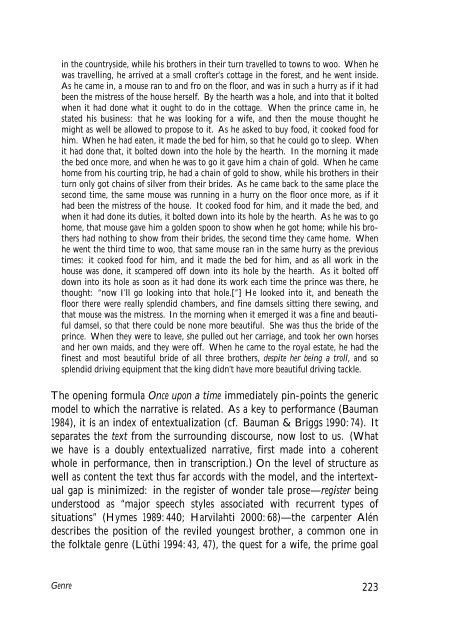The Genre of Trolls - Doria
The Genre of Trolls - Doria
The Genre of Trolls - Doria
You also want an ePaper? Increase the reach of your titles
YUMPU automatically turns print PDFs into web optimized ePapers that Google loves.
in the countryside, while his brothers in their turn travelled to towns to woo. When he<br />
was travelling, he arrived at a small cr<strong>of</strong>ter’s cottage in the forest, and he went inside.<br />
As he came in, a mouse ran to and fro on the floor, and was in such a hurry as if it had<br />
been the mistress <strong>of</strong> the house herself. By the hearth was a hole, and into that it bolted<br />
when it had done what it ought to do in the cottage. When the prince came in, he<br />
stated his business: that he was looking for a wife, and then the mouse thought he<br />
might as well be allowed to propose to it. As he asked to buy food, it cooked food for<br />
him. When he had eaten, it made the bed for him, so that he could go to sleep. When<br />
it had done that, it bolted down into the hole by the hearth. In the morning it made<br />
the bed once more, and when he was to go it gave him a chain <strong>of</strong> gold. When he came<br />
home from his courting trip, he had a chain <strong>of</strong> gold to show, while his brothers in their<br />
turn only got chains <strong>of</strong> silver from their brides. As he came back to the same place the<br />
second time, the same mouse was running in a hurry on the floor once more, as if it<br />
had been the mistress <strong>of</strong> the house. It cooked food for him, and it made the bed, and<br />
when it had done its duties, it bolted down into its hole by the hearth. As he was to go<br />
home, that mouse gave him a golden spoon to show when he got home; while his brothers<br />
had nothing to show from their brides, the second time they came home. When<br />
he went the third time to woo, that same mouse ran in the same hurry as the previous<br />
times: it cooked food for him, and it made the bed for him, and as all work in the<br />
house was done, it scampered <strong>of</strong>f down into its hole by the hearth. As it bolted <strong>of</strong>f<br />
down into its hole as soon as it had done its work each time the prince was there, he<br />
thought: “now I’ll go looking into that hole.[”] He looked into it, and beneath the<br />
floor there were really splendid chambers, and fine damsels sitting there sewing, and<br />
that mouse was the mistress. In the morning when it emerged it was a fine and beautiful<br />
damsel, so that there could be none more beautiful. She was thus the bride <strong>of</strong> the<br />
prince. When they were to leave, she pulled out her carriage, and took her own horses<br />
and her own maids, and they were <strong>of</strong>f. When he came to the royal estate, he had the<br />
finest and most beautiful bride <strong>of</strong> all three brothers, despite her being a troll, and so<br />
splendid driving equipment that the king didn’t have more beautiful driving tackle.<br />
<strong>The</strong> opening formula Once upon a time immediately pin-points the generic<br />
model to which the narrative is related. As a key to performance (Bauman<br />
1984), it is an index <strong>of</strong> entextualization (cf. Bauman & Briggs 1990: 74). It<br />
separates the text from the surrounding discourse, now lost to us. (What<br />
we have is a doubly entextualized narrative, first made into a coherent<br />
whole in performance, then in transcription.) On the level <strong>of</strong> structure as<br />
well as content the text thus far accords with the model, and the intertextual<br />
gap is minimized: in the register <strong>of</strong> wonder tale prose—register being<br />
understood as “major speech styles associated with recurrent types <strong>of</strong><br />
situations” (Hymes 1989: 440; Harvilahti 2000: 68)—the carpenter Alén<br />
describes the position <strong>of</strong> the reviled youngest brother, a common one in<br />
the folktale genre (Lüthi 1994: 43, 47), the quest for a wife, the prime goal<br />
<strong>Genre</strong> 223

















